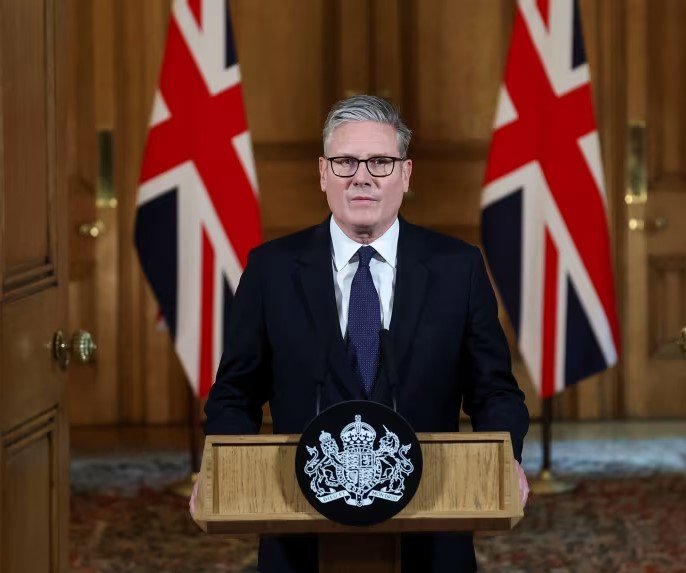In a historic and highly significant diplomatic shift, the Prime Minister of the United Kingdom has officially announced that the After France, UK Has Announced to Recognise Pales-tine as a state this coming September. This decision follows a similar declaration made by France earlier this year, and marks a bold move by the British government to support Palestinian statehood in an increasingly polarized global political climate.
Speaking during a parliamentary session and later addressing the media, the UK Prime Minister stated that this recognition is long overdue and comes as a part of the country’s renewed commitment to international justice, human rights, and peace in the Middle East. The decision, he emphasized, is not meant to fuel division or take sides in the conflict, but rather to acknowledge the legitimate rights of the Palestinian people to self-determination, freedom, and sovereignty.
The announcement is being hailed by many human rights organizations, political analysts, and pro-Palestinian advocacy groups as a turning point in Western foreign policy. The UK, being a permanent member of the United Nations Security Council and one of the key players in global politics, carries significant weight. Its recognition of Palestine is expected to encourage other European nations to follow suit, and could potentially reshape the narrative and direction of the long-standing Israeli-Palestinian conflict.
According to the Prime Minister, the formal recognition of Palestine will be announced at the United Nations General Assembly in September, where the UK will officially declare its support for a two-state solution—one that envisions an independent State of Palestine existing peacefully alongside the State of Israel. The UK will also begin the process of establishing full diplomatic relations with the Palestinian Authority, including the opening of embassies in both regions.

This recognition is also seen as a direct response to the recent escalation of violence and humanitarian crisis in Gaza and the West Bank, where thousands of civilians have lost their lives, homes, and livelihoods due to ongoing military operations and blockade-related restrictions. British officials say the government can no longer remain silent while a generation of Palestinians suffers under occupation and without a voice on the world stage.
Public reaction within the UK has been mixed but largely supportive. Many British citizens, especially from academic institutions, student unions, faith-based organizations, and the Labour Party, have long demanded that the government take a more balanced and moral stance on the conflict. Several mass protests have taken place in recent months across cities like London, Manchester, Birmingham, and Glasgow, calling for an end to violence in Palestine and for the UK to recognize its statehood.
The decision is, however, not without controversy. Critics, especially within pro-Israel circles and certain conservative groups, argue that recognizing Palestine at this moment might undermine ongoing peace negotiations or provoke further tensions in the region. Some fear it could damage the UK’s diplomatic relations with Israel, a long-standing ally, and possibly affect trade or security cooperation.
The UK government has responded to these concerns by clarifying that this decision is not an attack on Israel’s legitimacy or security. In fact, the Prime Minister assured that the UK will continue to support Israel’s right to exist within secure borders and will promote dialogue between the two states. However, he stated that for peace to be possible, both peoples must have equal rights, recognition, and protection under international law.x
Internationally, the UK’s announcement has already made waves. Palestinian leaders have expressed deep appreciation and called it a step toward justice. Palestinian President Mahmoud Abbas welcomed the move, saying it reflects a growing awareness among world powers about the realities on the ground and the urgent need to support Palestinian independence.
On the other hand, Israeli officials have expressed disappointment and concern, calling the decision premature and unhelpful to the peace process. The Israeli government reiterated its position that statehood should only be achieved through direct negotiations, not through international recognition.
With the September deadline approaching, all eyes are now on the United Nations, where the UK’s formal recognition of Palestine is expected to add significant momentum to the broader international movement supporting Palestinian statehood. This decision could very well become a catalyst for change, influencing more Western nations to follow the same path. READ MORE https://elevenpakistan.com/after-islamabad-donkey-meat-seized-another-city/
In the long term, the recognition of Palestine by major powers like France and the UK could pressure the international community to revisit the peace process with renewed urgency. It sends a strong message that the world is no longer willing to ignore the plight of the Palestinian people, and that peace, justice, and dignity should not be delayed any further.
As the world prepares for this momentous declaration in September, millions around the globe are watching with hope that this decision will bring Palestine one step closer to freedom, independence, and international acceptance.
READ MORE



